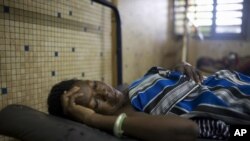The human rights group Amnesty International says Burkinabe women are dying needlessly during pregnancy and childbirth because gender discrimination prevents them from making key decisions about family planning and when to seek medical care.
As many as six women die every day in Burkina Faso as a result of pregnancy or childbirth. Burkina Faso is one of the poorest countries in the world, and Amnesty International says it is the country's poor, rural women whose lives are most in danger.
Many Burkinabe women are married by the time they are 19, and girls continue to be subjected to early, forced marriage and female genital mutilation.
An Amnesty International report points to poverty, and shortages of supplies and trained medical staff as well as corruption and gender discrimination as the underlying causes for high rates of maternal death in Burkina Faso.
Amnesty International West Africa Researcher Salvatore Sagues says maternal death is a preventable tragedy that can result from a woman's lack of control over her own sexual health. "Because of the low status of women in Burkina Faso, the women do not have any say in the most key decisions of their lives, including how many and when they will have children. Early pregnancies and repeated pregnancies may put the lives of women at serious risk," he said.
Sagues says preventing maternal deaths is also a question of improving access to care, particularly for rural woman.
Despite government subsidies since 2006 that sharply reduced the cost of childbirth, Sagues says poorly paid medical personnel still ask for informal payments with impunity. The report cites instances of staff forcing families to buy bleach to clean up birthing rooms or pay for ambulance services and medicine that should have been free.
Sagues says this corruption undermines the government's good intentions and the progress Burkina Faso has made in recent years.
Amnesty International recommends that reproductive health care be free in Burkina Faso, but Sagues cautions that the quality of health care must also be improved. "But, of course, we know that if medical treatment is free and the quality is not improved this will not make things change, because women will not be encouraged to go to the medical facility. So, we closely linked the total exemption of cost with the improvement of quality of care," he said.
Amnesty International's report also urges the Burkinabe government to stress the importance of family planning to prevent maternal deaths, unwanted pregnancies and unsafe, illegal abortions.
After Burkinabé mother Pauline Séwé's first child was born, she began going to a family health center in Ouagadougou and using birth control.
Séwé says she got married while she was a university student and birth control allowed her to space out her pregnancies and finish her master's degree before having her two other children. She says she has been very satisfied and encourages other women to go to the clinic. She says using contraception gives women the time to contribute to the development of their country as well as be mothers and good wives.
But Séwé says she is the exception. She says she is lucky to have a husband who supports family planning.
Sagues, of Amnesty International, said some men they talked to, particularly in rural areas, feared that birth control would encourage their wives to be promiscuous and unfaithful. Sagues said many women do not even know about the 2005 law that gives women the right to choose how many children they will have and when they will have them.
Burkinabé midwife Kadidia Diallo says that it is often the husband who has the final word when it comes to his wife's sexual and reproductive health, because he has the money.
Diallo says husbands can refuse to allow their wives to use contraception, telling her that it is God's will that she have his children. She says a woman can not decide to use contraception on her own because she does not have the money to pay for it. Diallo says without contraception, the woman's pregnancies will be too close together, weakening her body and making her more likely to die in childbirth.
Diallo says by the time a man decides to bring his pregnant wife to a health center she may already be too sick, the roads may be too poor, or there may not be proper medical staff on hand to save her.
Amnesty International says women have a right to adequate and accessible reproductive health care, and educating women and men in Burkina Faso about this right is key to ending maternal deaths.
Amnesty Points to Discrimination in Burkina Faso Maternal Deaths








